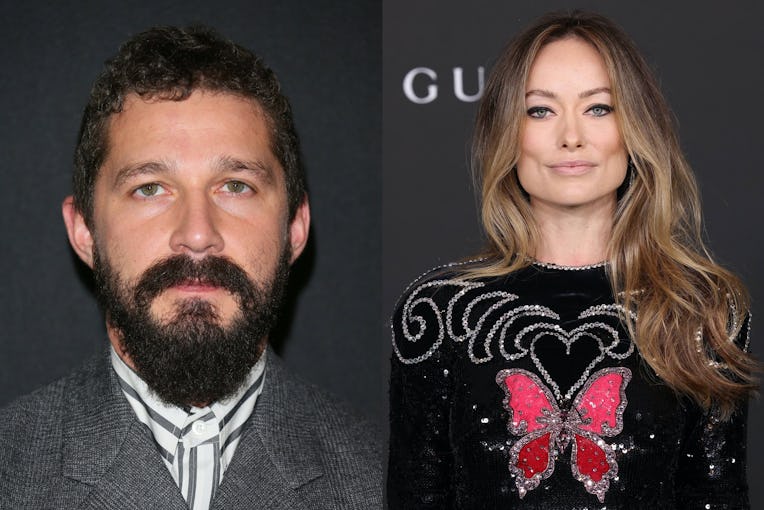Shia Labeouf to Olivia Wilde: You Can't Fire Me; I Quit!
The newly Catholic actor is not turning the other cheek

Here’s a good premise for a movie: a splashy film full of prescient social commentary and mid-century modern furniture directed by a promising female director starring a bright newish starlette and popstar-turned-actor… but maybe everything under the surface isn’t exactly as good as it seems? Just kidding, that would be horrible — but like all bad art, it is inspired by real events. Specifically, this is the ongoing slop being served at every turn in the endless Don’t Worry Darling press tour.
In today’s episode, Shia LaBeouf, who has been hiding out in the DMZ of “being canceled” and otherwise converting to Catholicism in his spare time, emerged from the dark to rebuff director Olivia Wilde’s claim that he was fired from her movie. In Variety, Wilde said:
His process was not conducive to the ethos that I demand in my productions. He has a process that, in some ways, seems to require a combative energy, and I don’t personally believe that is conducive to the best performances. I believe that creating a safe, trusting environment is the best way to get people to do their best work. Ultimately, my responsibility is to the production and to the cast to protect them.
LaBeouf, who did not comment on the Variety story before its publication, has now spoken out through the same publication with a slew of evidence, including text messages and emails and a video from Wilde asking him to give the project a chance, in order to maintain his story that he was not fired but rather quit the project over lack of rehearsal time.
There are sort of like one hundred things going on here which might lead you to believe that a game of four-dimensional chess is being played by one or everyone working on the film, but the situation as per both Variety stories seems relatively clear-cut. First and foremost, despite the “fired v. quit” conflict, the issue between Wilde and LaBeouf does seem to be a matter of lack of rehearsal time for an over-involved actor known for having a bombastic and confrontational personality. As per a video LaBeouf sent Variety from Wilde herself, the director says: “You know, I think this might be a bit of a wake-up call for Miss Flo, and I want to know if you’re open to giving this a shot with me, with us. If she really commits, if she really puts her mind and heart into it at this point and if you guys can make peace — and I respect your point of view, I respect hers — but if you guys can do it, what do you think?”
The “Miss Flo” in question is Florence Pugh, the film’s lead, who also seems to have some sort of unspoken conflict with Wilde at this point in time, absent from Don’t Worry Darling’s press tour as she continues to prep for Dune 2 (this would be my excuse also). At every turn in her increasingly defensive press tour, Wilde has defended and celebrated Pugh and her work in the film, only to be met with a deafening silence. What LaBeouf’s release of that video mostly states is that this is a director who has sought to protect her lead throughout the process, only to have the rug pulled out from under her at every turn.
In an email from LaBeouf to Wilde that the former shared with Variety, he wrote: “Firing me never took place, Olivia. And while I fully understand the attractiveness of pushing that story because of the current social landscape, the social currency that brings. It is not the truth.”
LaBeouf emerging at the eleventh hour to join in the ongoing Wilde pile-on feels spiteful and misaligned. Maybe it’s true that LaBeouf was not fired so much as he did quit, but Olivia Wilde can’t hurt his reputation anymore than he’s hurt it himself (and the actor says as much in his email to her). Wilde — who has been ghosted by her lead, ignored by her apparent boyfriend, humiliated by her ex, and now put on blast by her former employee — can’t catch a break. A press tour can’t salvage a movie that’s not good, but she’s getting hit at every turn, shouldering a relentless and misogynistic scolding for the type of otherwise rote Hollywood interactions that other filmmakers face with no fanfare. If the film is a failure, that’s her responsibility as its director: there’s no need to fan flames when the work will speak for itself.